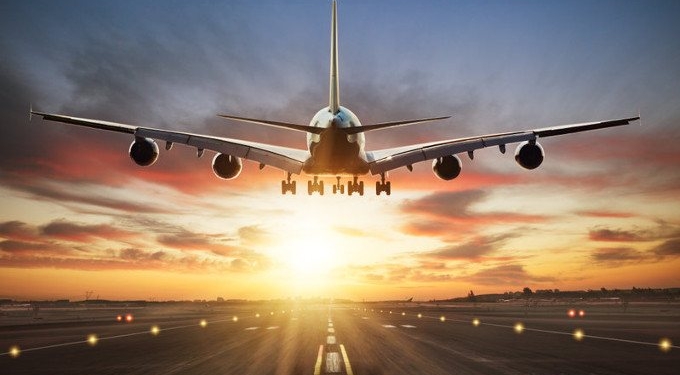
Executives from the biggest U.S. airlines asked the Biden administration for “immediate intervention” in today’s scheduled rollout of 5G technology near major airports, warning of an impending “catastrophic” aviation crisis when AT&T and Verizon deploy new 5G service.
Numerous international airlines in response canceled flights to certain U.S. airports — one suspended travel indefinitely — citing concerns over the upcoming 5G deployment and worries that some aircraft haven’t been cleared to fly into airports with 5G signals.
In a letter obtained by Reuters, the representatives of 10 carriers asked President Biden to delay the rollout near airports subject to Federal Aviation Administration (FAA) flight restrictions once the technology is deployed.
Full airline CEO letter https://t.co/NeXVJbFhzQ pic.twitter.com/ws5Y5HKx1X
— David Shepardson (@davidshepardson) January 17, 2022
The broader expansion of 5G on Wednesday will provide faster access to the internet than current wireless technology, but airlines warned new C-Band 5G service could leave a significant number of aircraft unusable indefinitely, and “could potentially strand tens of thousands of Americans overseas” and cause “chaos” for U.S. flights.
“The ripple effects across both passenger and cargo operations, our workforce, and the broader economy are simply incalculable,” the executives wrote. “To be blunt, the nation’s commerce will grind to a halt.”
“Unless our major hubs are cleared to fly, the vast majority of the traveling and the shipping public will essentially be grounded,” wrote chief executives of American Airlines, Delta Air Lines, United Airlines, Southwest Airlines, and others.
“This means that on a day like yesterday, more than 1,100 flights and 100,000 passengers would be subjected to cancellations, diversions, or delays,” the letter said.
The letter was addressed to White House National Economic Council Director Brian Deese, Transportation Secretary Pete Buttigieg, FAA Administrator Stephen Dickson, and Federal Communications Commission Chairwoman Jessica Rosenworcel.
Aviation regulators and airlines repeatedly raised concerns the new 5G technology would interfere with safety equipment used to determine a plane’s altitude.
United Airlines in a separate letter on Monday warned of “a devastating impact on aviation” if 5G is rolled out near airports.
“When deployed next to runways, the 5G signals could interfere with the key safety equipment that pilots rely on to take off and land in inclement weather,” United Airlines wrote, warning safety concerns could lead to “significant restrictions” on aircraft being able to operate at airports, including those in Houston, Newark, Los Angeles, San Francisco, and Chicago.
The FAA also warned potential interference could affect sensitive airplane instruments such as altimeters, and significantly hamper low-visibility operations.
The telecommunications industry countered that regulators and airlines have had years to prepare for 5G.
Countries ground international flights to the U.S.
Air India on Tuesday announced numerous flights departing from India to U.S airports would be canceled. Affected destinations include Boston, Chicago, Dallas-Fort Worth, Houston, Miami, Newark, Orlando, San Francisco, and Seattle.
The move is “due to operational concerns associated with the planned deployment of 5G mobile network services in the U.S.,” the company said.
Two major Japanese airlines — All Nippon Airways and Japan Airlines — announced canceled flights between Tuesday and Thursday to the U.S. due to 5G deployment, Nikkei Asia reported. The cancellation includes 10 scheduled flights affecting about 650 passengers.
Japan Airlines canceled three passenger flights and five cargo flights scheduled for Wednesday.
According to the Nikkei, All Nippon Airways said Boeing 787 planes are still operable amid 5G with equipment adjustments but the Boeing 777 aircraft may be affected, leading to canceled flights for the aircraft that cannot be switched.
United Arab Emirates announced on Wednesday it would halt flights to several American locations due to “operational concerns associated with the planned deployment of 5G mobile network services in the U.S. at certain airports.”
Emirates flies only the Airbus A380 jumbo jet and Boeing 777, which has not been cleared by the FAA to fly into airports with a 5G signal.
Verizon and AT&T temporarily halt 5G expansion near some airports
The flight cancellations came a day after Verizon and AT&T announced a temporary pause on the expansion of 5G services near some airports. The wireless carriers earlier this month delayed the deployment by two weeks at the request of Buttigieg and FAA administrator Dickson.
An AT&T spokesperson said:
“At our sole discretion, we have voluntarily agreed to temporarily defer turning on a limited number of towers around certain airport runways as we continue to work with the aviation industry and the FAA to provide further information about our 5G deployment since they have not utilized the two years they’ve had to responsibly plan for this deployment.”
Biden praised the decision, saying, “This agreement will avoid potentially devastating disruptions to passenger travel, cargo operations, and our economic recovery while allowing more than 90% of wireless tower deployment to occur as scheduled.”
Wireless companies and Biden did not say how long the pause would last.
“With the proposed restrictions at selected airports, the transportation industry is preparing for some service disruption,” plane manufacturer Boeing said Monday. “We are optimistic that we can work across industries and with the government to finalize solutions that safely mitigate as many schedule impacts as possible.”
The FAA said it “will continue to ensure that the traveling public is safe as wireless companies deploy 5G,” and will work with the aviation industry and wireless companies to “limit 5G-related flight delays and cancellations.”
Aircraft travel is far from the only concern when it comes to 5G deployment
“It’s unfortunate that advocates for human health and the environment don’t have the robust lobbying power of the airline industry,” said Robert F. Kennedy, Jr., chairman and chief legal counsel for Children’s Health Defense. “The damages to the human and natural biomes from WiFi dwarf the impacts of its interference with aviation altimeters.”
According to the newest data from the New Hampshire legislative commission, wireless technology produces significant negative effects on humans, animals, insects, and plants.
As millions of Americans are suddenly working remotely, it has proven to be a powerful opportunity for regulators to move 5G forward. Yet, in the face of expanding wireless connections, a landmark study recommends reducing exposure.
However, the structure required to support 5G will place cell antenna ports close to houses and workplaces, making it nearly impossible to avoid and raising people’s risk of excessive oxidative stress that may lead to anxiety, depression, and Alzheimer’s.

















